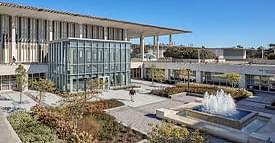Although there are common courses for all biology graduate students, each individual student selects his or her field of specialty and specific coursework, in consultation with the biology graduate advisor and their primary scholarly mentor.
The graduate program is designed to strengthen the student’s content knowledge, problem solving skills and research capability. Students who complete the degree will have an increased specialization in a biological discipline and an enhanced ability to do research. Students will be able to demonstrate their ability to interpret data and communicate such data in both a written and oral manner. Students will be prepared to work in the discipline of biology and will have sufficient background to be successful in future professional or doctoral studies.
Graduate students within the program are able to follow two options:
Option 1: Thesis
Students are advised to pursue this option if they wish to maximize their exposure to hands on research methodology. Students in this option design and carry out laboratory experiments or field research to address specific hypotheses related to unknown aspects of biology. Students select a thesis advisor with experience in that field of biology to help guide them through the process. Upon completion of the laboratory / field research, the results are communicated in both a formal thesis document and a seminar presentation.
Coursework would involve a total of 32 hours of graduate credit (500 or 600 level). 16 of those hours must be at the 600 level and come from the Biology discipline within the Department of Natural Sciences. Additional coursework may come from the Chemistry or Geology disciplines within the Department of Natural Sciences, Statistics, Agriculture or other departments, as approved by the biology graduate advisor and the thesis advisor.
Option 2: Scholarly Paper
Students are advised to pursue this option if they are seeking a MS degree that puts a greater emphasis upon traditional classroom coursework and does not involve as extensive involvement in novel experimentation or field research. Students select an advisor to oversee the development of a scholarly paper. This document may involve a certain amount of experimentation, which is not as extensive as the thesis option. The scholarly paper will review and synthesize various aspects of the established scientific literature related to a specific, narrow biological question.
Coursework would involve a total of 32 hours of graduate credit (500 or 600 level). 16 of those hours must be at the 600 level and come from the Biology discipline within the Department of Natural Sciences. Additional coursework may come from the Chemistry or Geology disciplines within the Department of Natural Sciences, Statistics, Agriculture, or other departments, as approved by the biology graduate advisor and the scholarly paper advisor.
TOP Scholarships
| Scholarship name | Award amount | Eligibility |
|---|---|---|
| - | - | - |
| - | - | - |
| - | - | - |
Key Resources for Your Study Abroad Journey
Scholarship Grants & Financial Aids
| Name | Scholarship Per Student | Level of Study | Type | |
|---|---|---|---|---|
| Young Professionals Program | Scholarship per studentVariable Amount | Level Of StudyDoctorate | TypeMerit-Based | |
| Innovation in Education Scholarship - La Tutors 123 | Scholarship per student₹ 42,970/Yr$500 | Level Of StudyBachelor | TypeMerit-Based | |
| Gyandhan Scholarship | Scholarship per student₹ 1.1 L/Yr$1,222 | Level Of StudyMaster | TypeMerit-Based | |
| Paul Foundation scholarships | Scholarship per student₹ 17.3 L/Yr$20,174 | Level Of StudyDiploma | TypeMerit-Based | |
| Debesh Kamal Scholarship | Scholarship per student₹ 1.2 L/Yr$1,385 | Level Of StudyBachelor | TypeMerit-Based | |
| Ritchie-Jennings Memorial Scholarship Program | Scholarship per studentVariable Amount | Level Of StudyBachelor | TypeMerit-Based |
Similar Colleges


University at Albany


Northern State University


Abilene Christian University
.jpeg?h=143&mode=stretch)

Ohio Northern University


University of South Carolina


University of Akron


State University of New York Polytechnic Institute


University of New Mexico














.jpeg?h=40&w=40&mode=stretch)













Comments